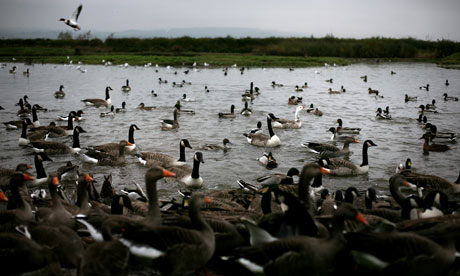Britain's waterbirds still being killed by lead poisoning, study finds
Wildfowl and Wetlands Trust demands review of laws restricting the use of lead in angling weights and ammunition across the UK

Birds return for the winter at Wildfowl and Wetlands Trust's Scott House pond in Slimbridge, Gloucestershire. Photograph: Martin Godwin for the Guardian
A large number of Britain's waterbirds are still being killed by lead poisoning despite the introduction of legislation to prevent the problem, according to a new study.
The Wildfowl and Wetlands Trust (WWT) found that 10% of dead waterbirds collected between 1971 and 2010 died as a result of the highly-toxic metal. Eight per cent were fatally poisoned between 2000 and 2010, with lead gunshot being the most likely source of poisoning.
The trust argued that laws restricting the use of lead in angling weights and ammunition were not working and called on a review of the legislation – which differs across England, Wales, Scotland and Northern Ireland.
It said: "Our results indicate that lead poisoning has continued to affect a wide range of British waterbirds long after legal restrictions were introduced.
"Existing legislation needs review and extension to ensure the delivery of international commitments and a broad-scale transition to the use of non-toxic shot and angling materials in all environments."
The WWT study, published in the European Journal of Wildlife Research, showed elevated levels of lead were discovered in the blood of 34% of waterbirds tested at four sites in Britain during the winter of 2010/2011.
Despite laws on lead use being introduced in line with an international agreement called the African Eurasian Waterbird Agreement, there has been no significant drop in the number of bird deaths, the WWT found.
Figures showed that in England, lead poisoning accounted for 14% of non-infectious causes of bird deaths between 1971 and 1987, 21% between 1988 and 1999 and 12% between 2000 and 2010.
But there was a marked drop in the number of lead-related deaths of mute swans for the same period, with respective figures of 25%, 5% and 2%.
On Wednesday, the Food Standards Agency suspended plans to warn pregnant women and young children about the health risks of eating game shot with lead ammunition. It had been expected to issue a statement offering official guidance for vulnerable groups eating deer, pheasant and grouse killed with lead shot.
No hay comentarios:
Publicar un comentario